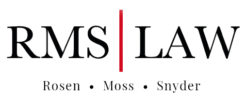Schizoaffective disorder is a chronic mental health condition characterized by the various symptoms of schizophrenia and the psychological conditions of either bipolar disorder or depression. Unfortunately, due to the split nature of the disease and its “invisible” signs, schizoaffective disorder may not be covered by employers when employees seek long- or short-term disability benefits. As the long-term disability lawyers in Villanova, PA, we at the law firm of Rosen Moss Snyder LLP provide the best legal representation for clients with schizoaffective disorder.
To learn more about schizoaffective disorder, keep on reading. Then, contact us if you or a loved one has been denied disability benefits or has had their benefits cut short due to this disorder.
Symptoms of Schizoaffective Disorder
Schizoaffective disorder is separated into two specific “types” based on the symptoms of two distinct mood disorders (bipolar disorder and depression) experienced simultaneously with schizophrenia.
Here are some of the most common symptoms of this disorder:
- Hallucinations & Delusions
As schizoaffective disorder always includes the symptoms of schizophrenia, those with the disease can begin seeing things that are not there or holding on to false beliefs despite evidence to the contrary.
- Depression
Those with the depressive type of schizoaffective disorder may experience feelings of sadness, hopelessness, lethargy, and emptiness, along with other symptoms.
- Mania
For those with the bipolar type of schizoaffective disorder, euphoric feelings and racing thoughts are common, along with higher instances of risky and other manic behaviors.
- Disorganized Thinking
People with this disorder can experience shorter attention spans, switch topics in an instance, and provide unrelated comments and answers to questions.
Diagnosis & Treatments of Schizoaffective Disorder
As we mentioned above, schizoaffective disorder’s symptoms are a combination of multiple conditions, so it can be challenging to diagnose. For a full diagnosis, patients must:
- Experience an extended period where a severe mood disorder occurs alongside symptoms of schizophrenia.
- Experience hallucinations or delusions for two or more weeks without an acute mood episode.
- Have symptoms of a severe mood episode existing throughout the illness’s duration.
Also, drug or medication abuse must not be responsible for the mood and mental symptoms. In some cases, a link between LSD abuse and schizoaffective disorder has been made; however, the continuing abuse of drugs can cause similar symptoms to the disorder, thus, hindering a potential diagnosis.
After a patient has received a schizoaffective disorder diagnosis, treatment becomes imperative to control symptoms. Through the use of medications (mood stabilizers, antidepressants, etc.), Psychotherapy, and self-care, controlling symptoms is possible. Sadly, the processes of diagnosis, treatment, and symptom control take time, and the symptoms of this disorder can negatively affect employee productivity and wellness. Even worse is that the validity of the diagnosis and the severity of the symptoms can be called into question by employers.
If you or a loved one have been diagnosed with schizoaffective disorder and your disability claim has been denied, or your benefits have been terminated early, the first place you should call is Rosen Moss Snyder LLP, the long- and short-term disability lawyers in Philadelphia. Contact us today, and we will represent you tomorrow!
